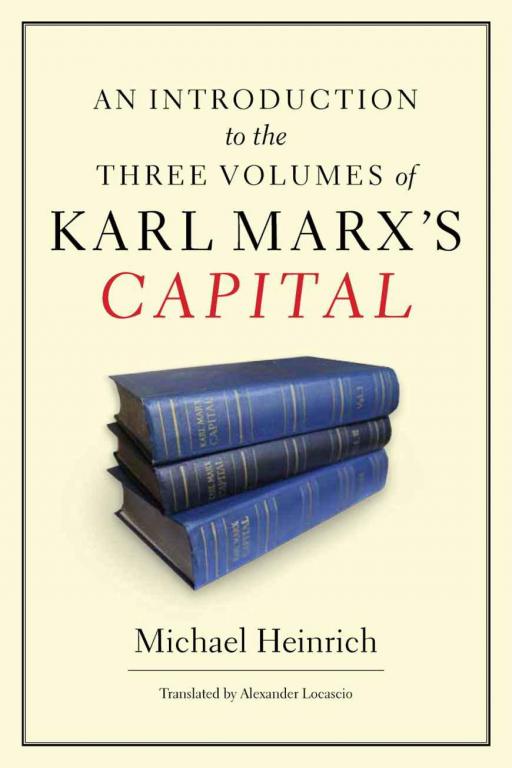What do you think?
Rate this book


240 pages, Paperback
First published January 1, 2004
The reason you would pick up this book is because you have not yet read Marx’s Capital and you would like an introduction. Presumably you hope to read only one such preparatory work before embarking on this journey, and so you are wondering if Heinrich’s offering suits your needs.
Heinrich checks a lot of boxes; at only 240 pages, this book is approachable yet quite comprehensive and precise in its overview of Marx’s three volumes. Despite these qualities, I wouldn’t recommend it as an introductory volume, because I think it fails to adequately present the discourse surrounding Marx’s work. Heinrich’s Introduction pushes the reader along a western chauvinist and nihilistic path that might take more than 240 pages (perhaps as many as 363 pages) to correct.
Heinrich intervenes in both the academic discourse as well as the practical Marxist discourse surrounding interpretations of Capital. However, he rarely names his opponents and even less frequently quotes them at length. Heinrich’s unnamed foes seem to be the weakest representatives of their various tendencies, resulting in strawmanned arguments. Heinrich declares easy defeats, positioning himself as the one true understander of Marx. At the level of academic discourse, the worst of these sins is his comparison of value form theory versus what he calls “substantialism” — always in scare quotes, and not (always?) a term his opponents would use to describe their own interpretation of the labour theory of value. His situation of Capital in practical applications of Marxism is even worse (particularly Chapters 11-12). During the twentieth century, revolutions guided by Marxism produced socialist states across the globe. This wave swept under-developed and colonized nations, not the industrialized nations early Marxists expected to see lead worker's revolutions. Heinrich has a sneering disdain for these efforts:
It is not sufficient for the transition to a communist society to conquer and defend state power during a weak phase of bourgeois rule, like Russia in 1917. Without the corresponding social and economic preconditions, a socialist revolution might be successful as a project to maintain the power of a political party, but not as a project of social emancipation.Heinrich’s solution is, implicitly, that these workers not attempt to liberate themselves, and instead suffer under colonialism while they wait for the lazy western movements to figure things out first. The futility and illegitimacy of their movements being clear, Heinrich barely engages with Marxist economists and philosophers hailing from the USSR, China or the Global South. To the extent he gives a nod to non-Western interpretations of Marx, he continues his practice of battling unnamed foes, referring to them obliquely as, for example, “worldview Marxists.” To be safe, Heinrich also dismisses dialectics (an important philosophical foundation for Soviet and Eastern socialism) as useless at best and sophistry at worst.
Heinrich’s vision of a post-capitalist society (which he emphasizes is not at all inevitable) is one of full democracy, zero scarcity, and abolition of the value form. But what does the transition to this state look like? Heinrich has no answer.
Heinrich’s dismissal of Marx’s (non-Western) successors is mirrored by the absence of his precursors; Adam Smith, Ricardo, etc, feature little in Heinrich’s overview. As a result, Marx’s brilliant critique (understood properly only by Heinrich, of course) springs from nowhere.
So here we see the seeds of the misconceptions readers introduced to Marxism via Heinrich may be imparted with: a smug sense of western superiority, a depressed sense that nothing can be done to bring about a better world, an elevated sense of Marx’s genius severed from his intellectual context, and a certainty that all other interpretations of Marxism (by critics left unnamed) are patently absurd.
For readers who want less of an introduction and more of an interpretation, Heinrich’s book has some valuable insights. For example, I appreciated his reframing of the debates on the tendency of the rate of profit to fall (TRPF) as questioning if it even matters if it falls. (Heinrich says no, see above regarding the non-inevitability of the fall of capitalism. I agree no, there are many other reasons to end capitalism.) Heinrich also emphasizes that not only workers but capitalists too are subject to domination by capital, a crucial point frequently elided by leftist anti-capitalists. Chapter 8 (“Interest, Credit, and ‘Fictitious Capital’”) and Chapter 10 (“The Fetishism of Social Relations in Bourgeois Society”) were clear treatments of complex subjects.
But for those looking for a preparatory read, where to turn? My experience was Marx’s Inferno by W.C. Roberts, which presents Volume 1 in the fiery discourse of its time, and also emphasizes the impersonal domination of capital (following Heinrich), while refraining from smug strawmanned arguments. However, Roberts’s text is academic, and assumes familiarity with basic Marxist concepts. Perhaps instead start with Wage Labour and Capital, a pamphlet written by Marx with the intent of introducing his work to a popular audience.